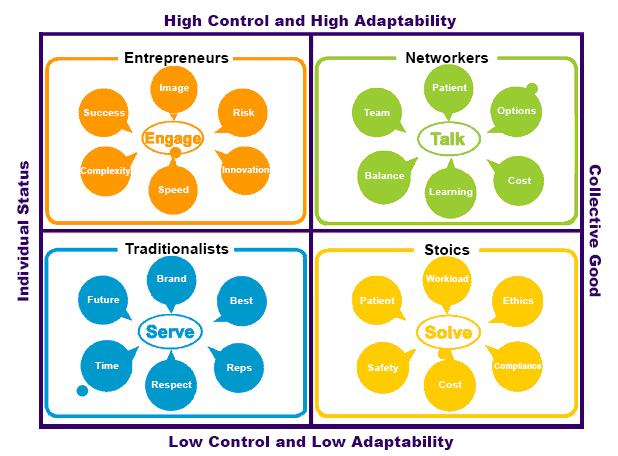
March 15, 2016
This evening's moderator, Glen Choma, kicked off the evening with some statistics from a UK study with respect to smart phones, revealing that people check their phone once every 4 minutes, adding up to a whopping 253 times per day! He pointed out that this would include physicians, as they are people too, and therefore, marketers need to be aware of such behaviours in order to properly address how customers want to receive information. He said, “Instead of share of voice, we're looking for share of mind.” He also quoted Bilbo Baggins from Lord of the Rings, who said, “I don't know half of you half as well as I should like.” Glen used this quote to illustrate the point that marketers need to get to know their customers better.
Glen introduced the first speaker of the night, Giles Atkinson, Training and Facilitation Lead at Environics Research Group Canada, who asked the question, “Are we addressing evolving healthcare practitioners' needs?” He said that the short answer is yes… but it's also no! He said that there are healthcare practitioners (HCPs) across the country who are getting the information they want, in the package they want, but there is still work to be done to reach the needs of more HCPs. He pointed out that, when determining importance to an audience, the question that needs to be asked is, “What do you value?” Giles then showed the results of some segmentation research that this company did with 1002 Canadian HCPs. The research showed that HCPs fall into one of four categories: entrepreneurs, networkers, traditionalists or stoics. He presented a slide that illustrated the four categories and their values, which is shown below:

He explained that “collective good” on the right side of the grid refers to physicians who are more patient-focused, whereas those on the left under “individual status” refers to more self-focused HCPs. Giles then provided a few details about each physician segment:
Networkers
Stoics
Traditionalists
Entrepreneurs
Giles pointed out that, in order to address the needs of the various HCP segments, a tailored approach should be used.
He concluded by speculating on what the future holds. He said that we should stop thinking about HCPs as being all the same and emphasized the importance of knowing your audience. The questions that one should be asking are, “Why do HCPs like this?” and “Why would they appreciate this?”
The second speaker of the evening was Dr. Alexandro Zarruk, a practicing physician in the West Island of Montreal and Hudson. His presentation was meant to address what innovation means to the practicing HCP. He began by listing the characteristics of an aspiring HCP, which are: compassion, analytical, team work, friendly, empathetic, communication, gratification and altruism. He pointed out that the reality of an HCP includes: knowledge, communicator, team work, time management, leadership, orchestrator, compassion and decision-making. He emphasized the word “orchestrator”, saying that HCPs need to be orchestrators for their patients and their staff. In order to accomplish this, and be better at time management and decision-making, HCPs need data. HCPs need innovation, excitement, guidelines, education, time-management and advances. He also mentioned that new treatment guidelines are very important to HCPs and they want to know about them.
Dr. Zarruk mentioned that HCPs are resistant to relationships with pharma, as they believe that pharma companies are simply out to make money. Therefore, he suggested that pharma redefine itself to HCPs, in the following manner:
“A pharmaceutical company is a business organization that furthers the knowledge of the HCP to better diagnose and treat a health affliction in the population he or she underserves.”
He then reviewed the types of interactions that HCPs typically have with pharma and their value:
Dr. Zarruk then gave some tidbits on how pharma companies can set themselves apart from others:
His final comments were in reference to innovative programs that pharma could consider offering, which included:
Dr. Zarruk concluded with the following take-home points:
At the end of the evening, there was a short question and answer period, during which the speakers provided the following comments:
Q: Other than reps, what are the channels that pharma can use, or what are the sources that you like to consult to get product information?
Q: Are specialists in the left quadrant of the grid more than the right?
Lara Holmes
Medical Writer
Email: lholmes@videotron.ca
Cell: 514-425-4977

Pharma411
Tuesday, November 17, 2020
Virtual Meeting
Time: 6:00 p.m. - 7:30 p.m.
Online only!
RSVP:
Tel: (514) 486-3458
Fax: (514) 486-4794
Creative by Lemieux Bédard
Printing courtesy of Data-Ad
AV courtesy of Pro-Staging
Digital courtesy of
Engage Presentations Inc.
Click here
NON-MEMBERS
Click here